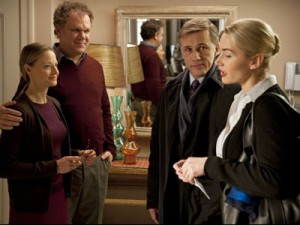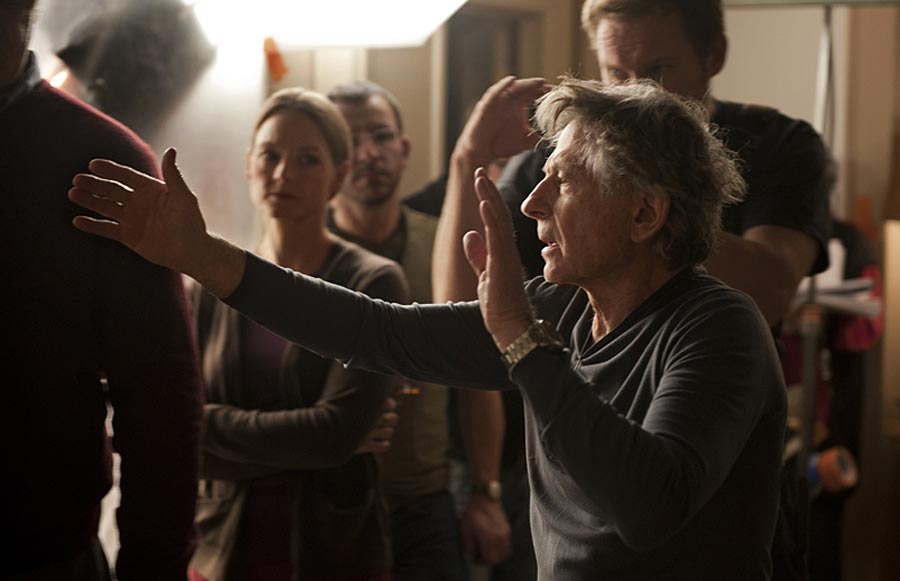Film Review: The Hilarious Hells of Reza and Polanski
As in the plays of Harold Pinter, Reza realizes that violence seethes underneath our words; our language betrays our better nature.
Carnage. Directed by Roman Polanski. At cinemas throughout New England.
By Tim Jackson

The couples in the film CARNAGE — Penelope and Michael Longstreet (Jodie Foster and John C. Reilly) and Alan and Nancy Cowan (Christoph Waltz and Kate Winslett).
The film Carnage, adapted from the play God of Carnage by Yasmina Reza, is tailor-made for a director like Roman Polanski with his sly ability to unsettle an audience by exploring the mental and physical confusions of his characters. Shot entirely in a single Manhattan apartment, the story centers on the dissolution of two middle class, professional couples, Penelope and Michael Longstreet (Jodie Foster and John C. Reilly) and Alan and Nancy Cowan (Christoph Waltz and Kate Winslett), as they attempt to hold a civil discussion over an earlier, violent playground confrontation between their 11-year-old sons. Ethan Longstreet has smashed in the teeth of Zachary Cowan with a stick. It begins with the couples searching for the right word for a collaborative statement about what happened between the kids:
Penelope: Armed? You don’t like ‘armed’—What shall we say, Michael, furnished, equipped, furnished with a stick, is that alright?”
Alan: Furnished, yes.
Michael: Furnished with a stick.
The nuance of Reza’s writing is evident in these early lines. Jodie Foster’s desperately repressed and controlling Penelope seeks sane redress. Christoph Waltz’s arrogant lawyer, Alan, is abrupt and distant and wants to get the discussion over with as soon as possible. John C. Reilly’s Michael appears to be the calm moderator, while Winslet’s Nancy is a bundle of nerves.
Essentially, the conflict revolves around language. Words hang in the air, get tossed around wildly, and become weapons. Allegiances turn on a word or a phrase. Kids can react with the swift crack of a stick. The adults talk and talk, slowly peeling back layers of good manners and social comportment and, plied with glasses of Scotch, eventually reveal the monsters inside. It’s all very funny when you’re not cringing. In our dark, little hearts lies a God of Carnage, as Alan describes it, a “ritualized and animalistic violent trait inherent to testosterone and to tribal warfare.”
As in the plays of Harold Pinter, Reza realizes that violence seethes underneath our words; our language betrays our better nature. This is one of the reasons the play is so much acidic fun on stage. Theater is the perfect medium for playing with language’s ability to evoke outrageous shifts of mood, emotional derangement, and psychological sparring.
Each new ensemble brings a fresh dynamic to the proceedings. The play, originally produced in French, has played around the world. The original, New York cast included Jeff Daniels, James Gandolfini, Hope Davis, and Marcia Gay Harden—with this cast, the dynamic seemed perfect. Another gathering of performers followed, and Christine Lahti, Annie Potts, Jimmy Smits, and Ken Stott provided an even blunter production. Each translation is reworked to the location and bends in a different way to fit the personalities of its cast.
Which bring us back to the screen version. Reza wrote the screenplay in collaboration with Polanski, whom she first met translating an adaptation of Kafka’s The Metamorphosis for the director’s production of that play in 1988. They are close friends. Their translation for the screenplay has a sharp edge that takes advantage of Polanski’s skill at being able to simultaneously generate belly laughs and terrible unease. He is a master of claustrophobia. He places his camera so that we are never more than a few feet away from the goings on. We are in the characters’ space and in their faces. They crowd us, and they crowd each other.
This ensemble of fine film actors excels in making the rapid, downward spiral of personalities compelling and credible. From the first moments of the film, you feel their repressed selves poking out of their civilized masks and you get hints at the dynamic between each individual couple. Without revealing details that will spoil the plot, note how Waltz seems to revel in his wife’s drunkenness or how Foster’s politically correct but terribly repressed Penelope unravels with a vengeance that delights her husband.
That we know these actors from their previous work serves to make the performances all the stronger: the befuddled and gentle Reilly has the potential to unhinge; Waltz’s smarmy, cell-phone obsessed lawyer both uses and transcends what we know of him from his award-winning performance as Col. Hans Landa in Inglourious Basterds; Jodie Foster’s Penny is committed to everything that is politically correct while seething with indignation and resentment; Kate Winslet’s marvelously nervous and befuddled Nancy careens from mousy to catastrophic as she belts down the liquor, with which she has probably had a problem.
In his play No Exit, Jean Paul Sartre famously said, “L’enfer, c’est les autres”—“Hell is other people”—a fitting attitude for both the theater of Yasmina Reza and the cinema of Roman Polanski. Together they have created a satire that has no exit but plenty of laughs, even if they are at our expense.

